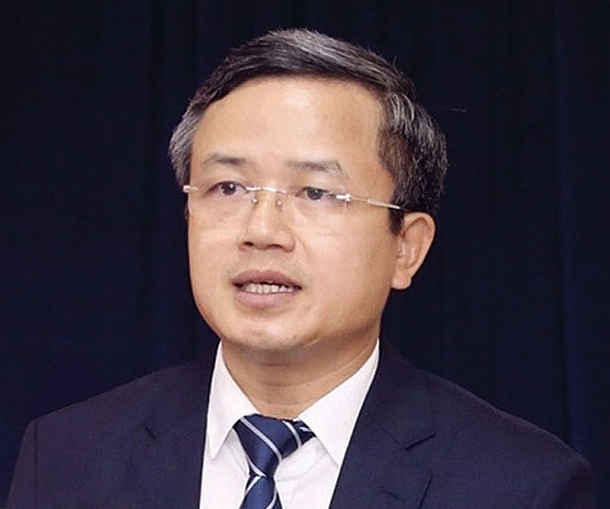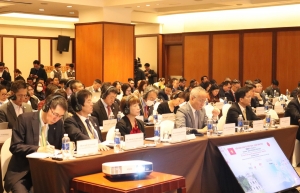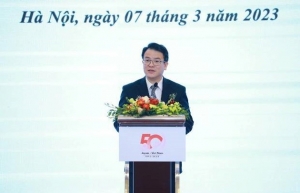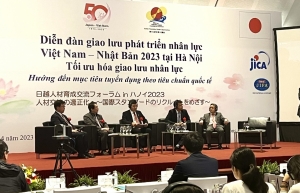Japan and Vietnam underline rules on workers abroad
Japan is not only the second-largest contributor of foreign direct investment to Vietnam, but also one of the main labour export markets of Vietnam. What results has the cooperation relationship between the two countries in labour and employment achieved in recent years?
 |
| Pham Viet Huong, deputy director of the Department of Overseas Labour under the Ministry of Labour, Invalids and Social Affairs |
Since the establishment of the official relationship in 1973, the exchange and cooperation relationship between the two countries has developed rapidly and is increasingly effective in politics, economy, culture, and society.
Cooperation in labour and human resource development between the two countries has been increasingly valued and has developed significantly in recent years.
Many programmes and projects such as technical intern-specific skilled workers training, and sending nurses and caregivers to Japan under the Vietnam-Japan Economic Partnership Agreement, have been implemented by the Ministry of Labour, Invalids and Social Affairs of Vietnam and Japanese agencies, and have reaped significant achievements.
In recent years, the number of Vietnamese labourers sent to Japan accounts for more than half of the total people working abroad every year. At present, nearly 200,000 Vietnamese workers and trainees are working in Japan, accounting for more than half of the number of foreign trainees there. This is a very positive result.
What are the new points in the scheme to send Vietnamese interns and workers to work in Japan?
In 2022, the Department of Overseas Labour held a number of conferences to implement new regulations on sending Vietnamese interns and workers to Japan for dispatching enterprises in Hanoi and Ho Chi Minh City. It coordinated with the Organisation for Technical Intern Training and the Japan International Training Cooperation Organisation to introduce new regulations for trade unions and enterprises in Tokyo and Osaka.
In sending Vietnamese trainees and workers to Japan, there are some new points, including regulations on conditions for enterprises sending people; conditions for the nursing profession; general provisions on labour contracts and other documents; specific regulations on expenses to be paid by the receiving side; and regulations on the responsibility to pay fees for interns and workers.
What policies does Vietnam have to promote cooperation, exchange, and human resource development not only with Japan but also with many other countries?
In 2020, the National Assembly promulgated the Law on Vietnamese Guest Workers, and the government and relevant ministries and branches issued legal guidance documents, creating a legal corridor for this activity. The law adjusted and supplemented new content in line with the reality and development of migrant workers and included some key new points.
Firstly, policies related to Vietnamese working abroad under contracts are ratified. Additional policies are added to ensure the state’s support mechanism during the process before, during, and after returning to Vietnam, encouraging the improvement of professional and technical qualifications of workers, and ensuring equal and non-discriminatory employment opportunities. It also provides investment support for vocational education institutions involved in the maintenance and improvement of vocational skills and foreign languages.
The law also added a number of prohibited acts for Vietnamese workers working abroad, including defrauding workers, human trafficking, exploitation and forced labour, and discrimination, among other points.
Next, it expanded the scope of application of the law and supplemented regulations to better protect the rights of Vietnamese workers abroad. Vietnamese citizens entering into labour contracts after exiting the country can register online with Vietnamese state agencies to receive support and benefits from the Fund for Overseas Employment Support, for example.
Furthermore, the law improves service operation conditions and responsibilities of enterprises, agencies, and organisations sending workers abroad. It supports a number of conditions for enterprises to obtain the operation licence to provide services. Accordingly, enterprises must pay the entire remuneration under the brokerage contract to the foreign party receiving the labour and may not require the employee to partially refund this amount.
Finally, the law supplements regulations on the construction and operation of a database system on Vietnamese workers abroad. It simplified and reduced admin procedures and shortened the time limit for handling procedures such as granting and re-granting a licence, and registration of labour contracts.
 | Forum promotes ties between Vietnam and Japan The 2023 Vietnam-Japan Economic Forum marks the 50th anniversary of diplomatic relations between Japan and Vietnam and represents an opportunity for business leaders from the two countries to meet, exchange, and seek cooperation on future development plans. |
 | Vietnam and Japan cooperate for a net-zero carbon future Japan is promoting green growth cooperation with Vietnam, with low-carbon value chains considered one of the leading priorities. |
 | MPI to strengthen ODA cooperation between Vietnam and Japan The Vietnam-Japan relationship was one of the most successful bilateral development cooperation relationships in recent years. |
 | JICA and ILO promote cooperation between Vietnam and Japan The 2023 Vietnam-Japan Human Resource Development Exchange Forum 2023 was held on April 5 and discussed how to optimise the exchange of human resources between the two countries. The forum was organised by the Japan International Cooperation Agency (JICA) together with the International Labour Organisation (ILO) and the Vietnam Labour Export Association. |
What the stars mean:
★ Poor ★ ★ Promising ★★★ Good ★★★★ Very good ★★★★★ Exceptional
Related Contents
Latest News
More News
- Masan Consumer names new deputy CEO to drive foods and beverages growth (February 23, 2026 | 20:52)
- Myriad risks ahead, but ones Vietnam can confront (February 20, 2026 | 15:02)
- Vietnam making the leap into AI and semiconductors (February 20, 2026 | 09:37)
- Funding must be activated for semiconductor success (February 20, 2026 | 09:20)
- Resilience as new benchmark for smarter infrastructure (February 19, 2026 | 20:35)
- A golden time to shine within ASEAN (February 19, 2026 | 20:22)
- Vietnam’s pivotal year for advancing sustainability (February 19, 2026 | 08:44)
- Strengthening the core role of industry and trade (February 19, 2026 | 08:35)
- Future orientations for healthcare improvements (February 19, 2026 | 08:29)
- Infrastructure orientations suitable for a new chapter (February 19, 2026 | 08:15)

 Tag:
Tag:



















 Mobile Version
Mobile Version